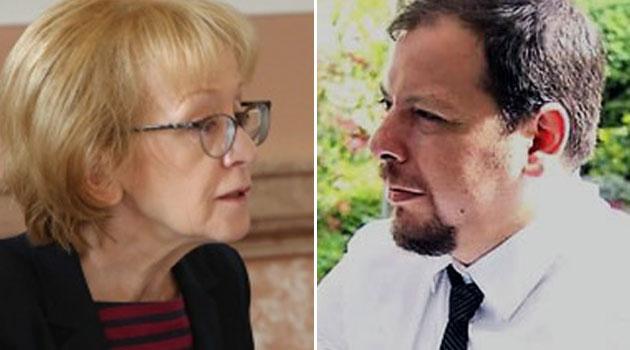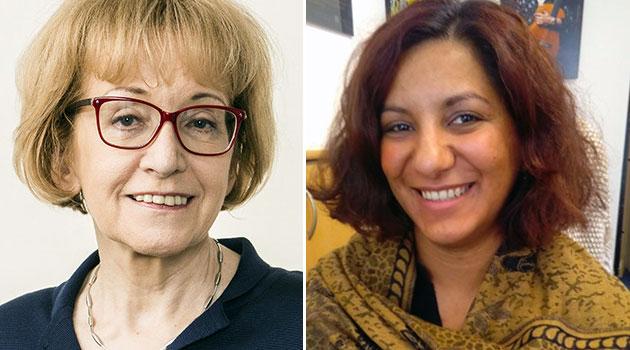Third volunteer civil society member resigns from Czech Govt Council on Roma Affairs because of Human Rights Commissioner

Most volunteer civil society members of the Czech Government Council for Roma Minority Affairs will continue to work with Government Human Rights Commissioner Helena Válková and are not claiming she should resign. That is the upshot of interviews with some volunteer civil society members of the Council filmed by ROMEA TV after Friday’s extraordinary meeting during which Válková described and explained the circumstances of how the much-criticized articles that she co-authored before 1989 were produced.
Válková did not convince volunteer civil society member František Bikár, who announced at the end of the meeting that he would be resigning from the Council. He is the third such member to do so because of what has come to light about Válková’s pre-1989 work.
In the late 1970s Josef Urválek, the prosecutor in the 1950 show trial of Milada Horáková (which resulted in her execution), was listed alongside Válková as the author of an article defending the institution of protective surveillance, a law enforcement option that was actually abused by the communist regime to bully dissidents, and on Friday Válková explained how that co-authorship came about. Her co-authorship of an anthology from the 1980s about juvenile delinquents from the Romani community was also discussed.
Some volunteer civil society members also criticized her for voting against stripping Czech MP Miroslav Rozner (“Freedom and Direct Democracy” – SPD) of his parliamentary immunity so he could be prosecuted for having called a former concentration camp for Romani people a “pseudo-concentration camp”. At the close of the extraordinary session, Bikár resigned his membership.
“I communicated the reasons for my resignation to Ms Válková in person during the extraordinary meeting Friday. Although I listened to her explanation as to why she co-authored work with the communist prosecutor Urválek and which articles she authored in the anthology about the ‘criminality of cikáni’, I no longer have confidence in the current Commissioner,” he told news server Romea.cz.
“I think that although some civil society members are arguing in favor of Ms Válková’s diligence, they themselves are not clear on the question of whether they should have confidence in her. Among my fundamental criticisms of Ms Válková is decidedly her co-deciding not to strip MP Rozner of immunity for prosecution in association with his remark about a ‘pseudo-concentration camp at Lety’. After all, that did not happen during deep communism, but last year. The unwillingness of the Commissioner to resign her post pushes the boundaries of what we ourselves are able to accept as the cost of membership in the Council,” Bikár said.
Válková said she was satisfied with the outcome of the meeting. “I explained what I considered necessary, just as I did at the Government Human Rights Council. That means I corrected the record with respect to the lies that the mass media are disseminating about me. I documented that for them with concrete information and I am glad that we have arrived at an outcome that is good for me and my continuing in the position of Government Human Rights Commissioner. From that perspective I’m satisfied,” she told ROMEA TV.
The Commissioner declined to answer the question of whether she had shown Council members originals of the anthologies about which the media have reported. “I won’t be discussing any of that because that’s exactly what I want to speak specifically about with each of the councils [Translator’s Note: the Commissioner is in charge of seven councils total] so that everybody has the same chance to ascertain the kind of untruths being disseminated about me and so I can explain whatever is unclear,” she said, cutting the interview short.
Volunteer civil society member Jan Husák, a Vice-Chair of the Council, rejected the idea that he would be resigning his post and told ROMEA TV: “We’ve now had the opportunity to speak with her and to ask her questions. She presented the entire breadth of this problem to us and changed our insight into the entire affair somewhat. […] We communicated to Ms Válková today that those publications were unfortunate. The view of the whole publication and what it sounded like is slightly different from what is being presented in the media. […] We have to follow this in the context of the time and what’s more, she did not work on that anthology alone, it was a team of authors, and back then she based her work on some sources that had been compiled before she joined the research institute…”
According to volunteer civil society member Simon Slanina, the media have distorted some information about the Human Rights Commissioner. ” …I don’t consider relevant … this entire scandal. It is not the Council’s role to either appoint or dismiss the professor …” he told ROMEA TV.
Volunteer civil society member Martin Kaleja did not want to make an assessment of the content of the anthology about Romani people that Válková contributed to as a co-author. “… The information that has reached me or is reaching me is not necessarily complete, in other words, in this affair I am actually reserving judgment …” he told ROMEA TV, adding that he had not seen the anthology, just excerpted texts, and that he believes they had been taken out of context.
“Also, I basically don’t even know to what degree the author was the Commissioner, because she said she co-authored some of the texts, in other words, that means it logically follows that some sections of the text she authored and others she didn’t,” Kaleja said, adding that in his view the Commissioner is implementing measures that aim to support Romani people. ROMEA TV wanted to give some other volunteer civil society members of the Council room to express their views, but they declined to do so after the extraordinary meeting on Friday.
The Council is composed of representatives of the state administration and the so-called citizens’ section, which is usually composed of 15 Romani men and women; after the resignations of three volunteer civil society members this year, there remain 12 such members on this advisory body.
RESIGNED
PhDr. Renata Köttnerová, volunteer civil society member of the Council appointed 12 May 2014
Mgr. Lucie Fuková, volunteer civil society member of the Council appointed 12 May 2014
František Bikár, volunteer civil society member of the Council appointed 12 May 2014
CURRENT VOLUNTEER CIVIL SOCIETY MEMBERS
Mgr. Jan Husák, a Vice-Chair, appointed 11 January 2019
Mgr. Alica Sigmund Heráková, volunteer civil society member of the Council appointed 8 March 2018
Iveta Theuserová, DiS., volunteer civil society member of the Council appointed 11 January 2019
Petr Torák, MBE, volunteer civil society member of the Council appointed 8 March 2018
Doc. PhDr. et PhDr. Martin Kaleja, Ph.D., volunteer civil society member of the Council appointed 12 May 2014
Čeněk Růžička, volunteer civil society member of the council appointed 12 May 2014
Bc. Edita Stejskalová, volunteer civil society member of the Council appointed 12 May 2014
Josef Stojka, volunteer civil society member of the Council appointed 8 March 2018
Štefan Oláh, volunteer civil society member of the Council appointed 8 March 2018
Bc. Tomáš Ščuka, volunteer civil society member of the Council appointed 11 January 2019
Simon Slanina, volunteer civil society member of the Council appointed 11 January 2019
Bc. Zdeněk Guži, volunteer civil society member of the Council appointed 11 January 2019
OTHER MEMBERS
Andrej Babiš, Chair of the Council, Prime Minister of the Czech Republic
prof. JUDr. Helena Válková, CSc., a Vice-Chair of the Council, Czech Government Human Rights Commissioner
PhDr. Jana Horváthová, director, Museum of Romani Culture in Brno, a state contributory organization
PhDr. Martin Povejšil, Deputy Minister for Administration of the Security Section, Multilateral Deputy Minister for Administration of the Multilateral Security Section, Foreign Affairs Ministry
Ing. Karel Tyll, Deputy Minister, Section 06 – Public Budgets, Finance Ministry
PhDr. Lubomír Zaorálek, Culture Minister
Mgr. Michal Franěk, Deputy Justice Minister
Václav Strouhal, DiS., Representative of the Regional Coordinators for Romani Affairs
Ing. Klára Dostálová, Minister for Regional Development
Ing. Robert Plaga, PhD., Education, Youth and Sport Minister
Jan Hamáček, Interior Minister
Dipl.-Pol. Jana Maláčová, MSc., Labor and Social Affairs Minister
prof. MUDr. Roman Prymula, CSc., Ph.D., Deputy Minister for Health Insurance, Health Ministry
RNDr. Petr Pospíšil, Union of Cities and Municipalities of the Czech Republic
Jiří Navrátil, Association of Regions of the Czech Republic
